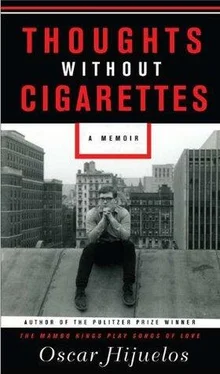Later, I fell asleep under a tree, and I felt drowsy still as my uncle carried me back through the narrow streets of that little sun-parched town, folks standing by the doorways of their palm-thatched houses along the way, calling out and waving at us. At any rate, I guess I can say that on that day, I had been baptized in the Cuban sea.
Now, while staying on Pepito’s farm in the countryside outside Holguín, I became deeply fond of nature, or so I’ve been told. In that campo persisted a strong, almost overwhelming scent, not of animal dung or of burning tobacco but of an aroma I still recall from that visit — the air always smelling like the raw inner marrow of a freshly cut or snapped-open sapling branch, redolent of the juices of its white and yellow fringed fibers, of the earth and water, and of greenness itself. There were insects everywhere, and blossoms peeking out from the dense bush and forests around us, and at night, when mosquito netting draped the windows, beetles the size and weight of walnuts pelted the walls, with no end to the tarantulas, lizards, and vermin inhabiting the raised-on-pylons under-portion of the house, where the smaller livestock sometimes slept. The crystal night sky over rural Oriente, with a dense sprinkling of stars as seen from Pepito and María’s porch, still remains clear to me, but it was the farm’s animals that I grew most attached to. I seem to have felt a special fondness for the pigs, into whose pens, to my mother’s consternation, I often wandered. Or else I kept chasing after those plump and squealing creatures in the front yard, spending so much time with them that it was easy for me to imitate their guttural swallowing, as if I were a bristly snouted animal myself instead of a spindly boy whom my cousins had already nicknamed “ el alemán ,” or “the German,” for his looks. Apparently, I pecked at the ground like the hens and cawcawed like the roosters, doubtlessly running barefoot in their leavings. I played with chameleons and bush lizards as if they were my friends.
One morning, when the family had decided to throw a party for their neighbors, Pepito, ordering some hands to dig out a pit in the yard under a tamarind tree, called my brother and me to his side so that, I suppose, we could witness the slaughtering of a pig. The poor thing must have known what was going to happen, for my cousins Bebo and Macho, in their sturdy teens, struggled while dragging it out from its wire pen, and it put up a terrible fight, trying to run away, until with a quick thrust of a blade against its neck, Pepito ended its struggles. (It squealed in terror, snorted, collapsed, and then, trembling slightly, eyes expanded, gave out a final cry before dying.) Soon, they’d dragged it into another shed, where it was cleaved in half, its guts pulled out, and then each side, tied by the hooves, was hung off a hook, buckets left underneath to catch the dripping blood. The penetrating smell of that pork flesh and its blood made me step away; it was probably a pal of mine, but I remained on hand when those sides were hauled out into the yard to cook over a smoldering pit. It would take hours to roast the lechón to “crackling perfection,” as the cookbooks might say, but in the meantime, something awry happened — an iguana, crawling over, embedded itself inside one of the flanks. The easiest solution, it seemed, came down to smoking it out, and so they hung that side up under a tamarind tree and built a fire underneath it. However, the wood was too green, or the flame too high, because shortly a column of thick, black smoke went billowing upward into that tree and, at a certain moment, a commotion arose in the branches; soon the tarantulas that had been nesting there panicked, for from its lowest branches, a rainfall of those creatures came dropping down by the dozens, like black flowers, and began scattering wildly in all directions in the yard. There were so many that even the women were recruited to hunt them down, the family rushing after the creatures with brooms and shovels and pans lest they get underneath the floorboards and take over the house for good. Indeed, I remember that.
Somewhere along the line, however, there came the moment when I didn’t seem well. My mother’s always claimed that I had the worst habit of drinking from puddles in the countryside, especially after a rainfall, and while you’d think that such water — Cuban water — falling from God’s skies would be pure as any could be, I came down with something anyway, my face and limbs blowing up, and my manner becoming so listless that I was confined to a bed for days, my uncle and aunts convinced that I had perhaps suffered from an allergic reaction to an insect bite. I don’t recall at which point this happened. But those first signs of my illness could have taken place after we’d made a trip to see my father’s family in Jiguaní, which was about fifteen miles away, though, if so, I would have been too late to meet my great-grandmother, Concepcíon, who’d died the year before, at one hundred and thirteen, from diabetes. (Her mind was intact and spirits good, even if both her legs had been amputated; among her last words, I’ve been told, were: “I may have been ugly, but I was lucky in life.”) Or perhaps I’d gotten sick, so my mother has also claimed, from something I’d eaten, perhaps a piece of delicious pork, an undercooked morsel, or one I’d picked up off the ground the day when those tarantulas fell from the tree. Or at the beach near Gibara, a prickly mollusk had jammed something vile into my foot, and it had gotten infected without anyone knowing. Or, perhaps, in the midst of some Cuban miasma, for in the woods there were an abundance of stagnant mosquito-ridden ponds, I had sucked into my lungs some germs, or what my mother called “ microbios .” Still, I can’t say just when the symptoms of my illness first came over me, and what recollections I have of that little piece of Cuba hardly summon up any moments of particular discomfort. But during that summer when I turned four, from some mysterious source, those microbios , which my mother, with an almost medieval panache, would describe as “ animalitos ”—or little animals — slipped inside my body, those parasites (or whatever they were) filling my system with their venom.
Still, whatever ailed me took several months to really manifest itself, and even then, I’m not sure of the day and hour when my mother or any of my other relatives became aware that what I would come to think of as my Cuban disease had taken hold, or even if it was noticeable enough to be truly worrisome to them at first. In any event, by the end of that summer of 1955, I just wasn’t up to snuff, low of energy, and perhaps even more apprehensive and nervous looking than before.
Maybe I’ve come to read too much into the slightest of my expressions, but the single thing I have to go by comes down to the only photograph taken of me in Cuba. It was posed in the salon of my aunt Cheo’s house in Holguín. Cheo’s daughter, the pretty auburn-haired Miriam, with the serious expression of a young girl who had recently lost her father, and my ethereally pretty cousin Cuza were standing beside my mother and brother, his face unfortunately partly obscured. I’m sitting out front on a little chair, dolled up like a little Lord Fauntleroy, my hair blond and wavy, my cheeks covered with freckles, my pudgy knees dimpled, and on my face, if I’m not mistaken, is a look of not just timidity or shyness but of anxiety, as if I knew what was to come.

By the time we eventually returned to New York, late that summer, I had become bloated and listless, with a constant fever and an overwhelming desire to sleep, a crisis coming about one evening in our apartment when, in whatever manner such discoveries are made, my mother found a shocking amount of blood in my urine. What ran through her mind in such a moment, I can’t say, but she must have been frightened to death over what my father might do to her if something bad happened to me. Off in his own universe of pots and pans, steaming soups, hamburger platters, and grilled steaks by day, and coming home to manage as best he could through those evenings, clouds of cigarette smoke wafting through the apartment, it’s possible that he hadn’t particularly noticed the way I looked, or my lethargy. With his early morning/afternoon schedule at the hotel and his habit of staying up late with his chums, perhaps he just hadn’t been paying attention. But whatever his state of awareness, when my mother, in shock or denial, without knowing what else to do, finally let him in on my condition — she must have been shaking and worried out of her mind — Pascual, speaking much better English than she, rose to the occasion. Having a good side — a kind of calmness and a reasoning manner about him when he hadn’t been drinking — he quietly tapped on our neighbor’s door to use the telephone. But if the elderly Mrs. Blair didn’t own one yet (though I remember that, in her hallway not far from her door, a heavy black old-fashioned rotary telephone sat on a table), he probably went down to the corner pharmacy to call our doctor, a Sephardic Jew of advanced years named Altchek, who had an office on 110th and Lenox in East Harlem. In that distant age when New York physicians responded quickly to house calls, he arrived at our apartment within the hour, to find me lying on their bed, barely able to move. Always impeccably dressed, Dr. Altchek, whose dark and liquid eyes, I remember, were filled with both sorrow and compassion, quickly went to work. What examinations he administered I do not recall, though I have the distinct memory of his feeling around my swollen abdomen with his fingers and of his thumb opening my right eyelid, that he shined a light into my pupils. It wasn’t long before he, declaring my condition muy grave ( grave is the word my mother always used), told my parents that I had to be rushed to the closest hospital, St. Luke’s, fortunately only five blocks away.
Читать дальше













